It can be very disconcerting to a loving cat parent when their cat starts acting scared. True, some cats are naturally more nervous or jumpy than others, but if the change is sudden and unexpected, it’s important to try and work out what’s going on.
Fear can be triggered by something momentary, or it can be linked to longer-term issues related to a cat’s health, environment, and/or experiences. If you’re struggling to work out why your cat is so afraid all of a sudden, this list of potential triggers may give you an idea.
The 10 Possible Reasons Your Cat is Scared All of a Sudden
1. Certain Scents
Suddenly getting a whiff of something new, strange, or that reminds them of an unpleasant experience is enough to send some cats into a tailspin. For example, let’s say you arrive home after taking another pet for a vet checkup. Your cat will be able to smell the vet clinic on you or your other pet, potentially triggering the stress response.
Even if your cat has never had a particularly traumatic experience at the vet’s, most cats find vet visits stressful (or even terrifying in some cases), so the mere scent of the vet clinic could send them running and hiding.
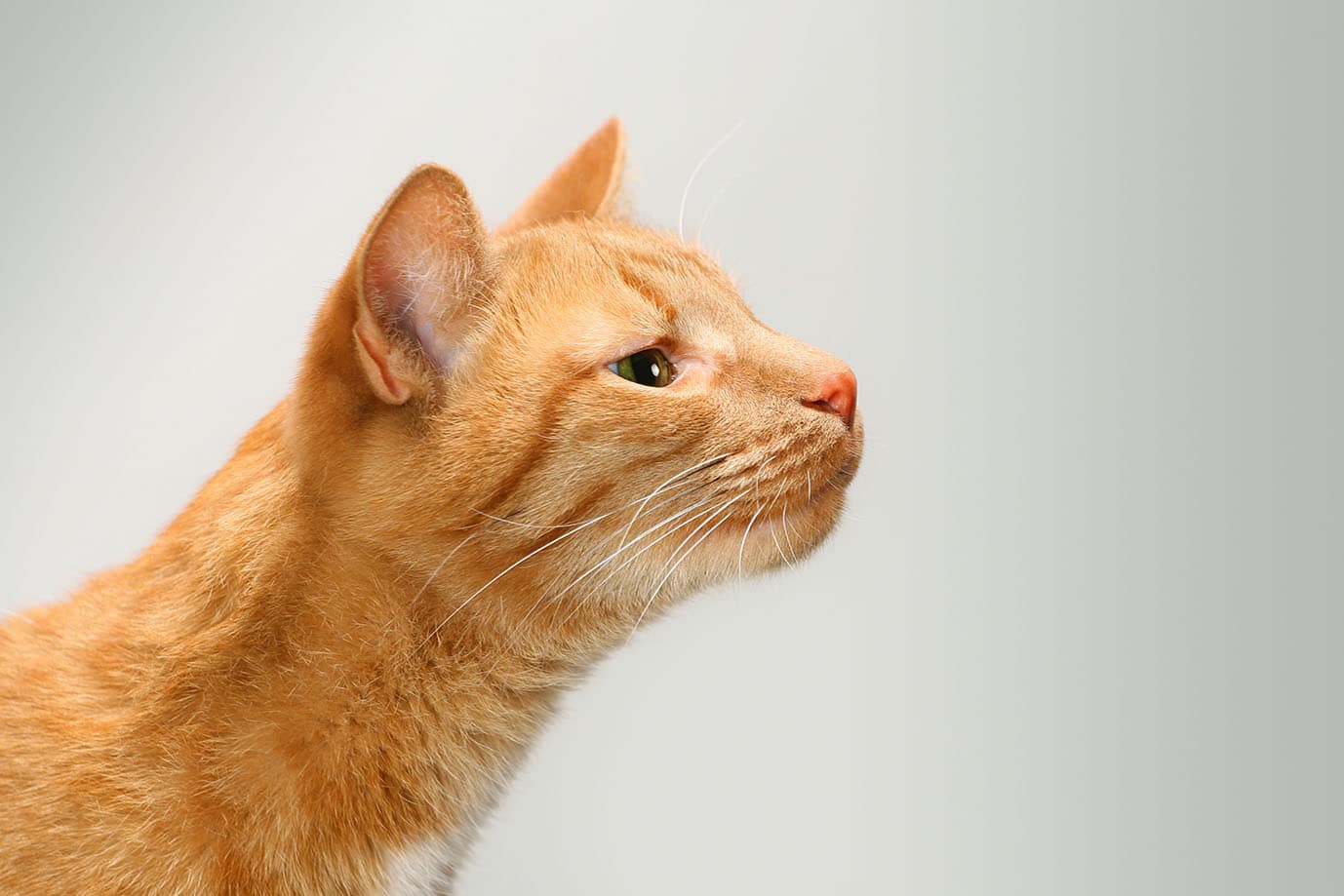
2. New Objects
Cats are often suspicious of new objects, and this can turn to fear when they suddenly come across a new object that they’ve never encountered. This response has been captured time after time in the “cat scared by cucumber” YouTube videos.
Some theorize that this response is triggered because cucumbers resemble snakes, but it more likely has more to do with the novelty of the object rather than a fear of snakes.
3. Past Trauma
Just like humans, cats can be traumatized by certain events in their lives, and this can have a lasting effect. Cats may be emotionally traumatized by things like being abused by a former caregiver, neglect, injuries, or generally frightening situations.
For example, if a cat was once attacked by a dog, they may go on to fear any dog they encounter in the future, even if those dogs do not behave threateningly toward them. Even smelling a dog nearby could be enough to cause immense stress.
You may not always be able to see what’s frightening your cat, but they can sense it because they have a much better sense of smell than we do.
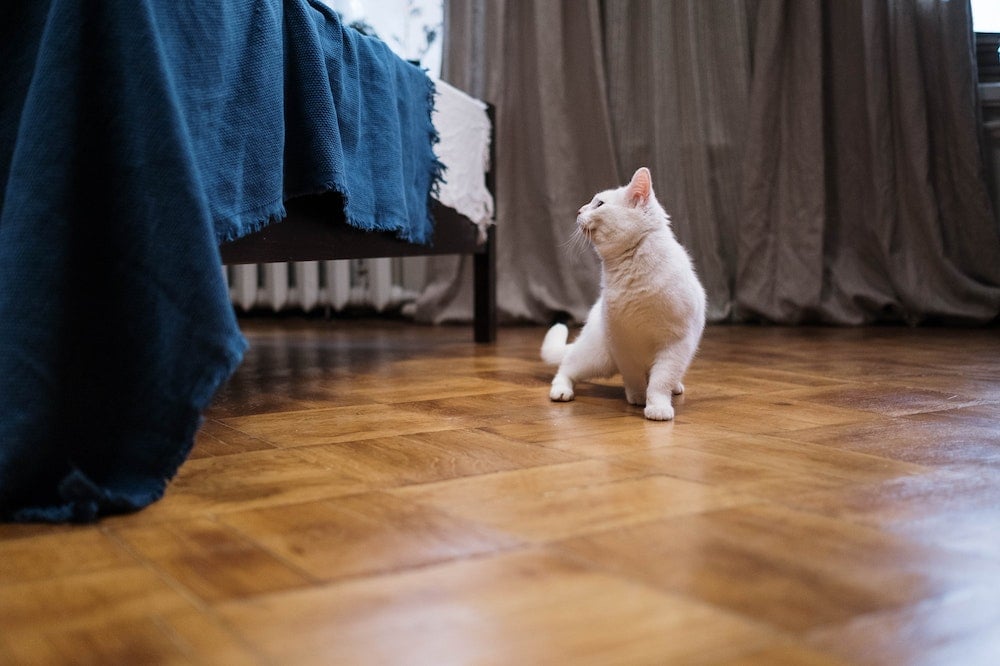
4. Mirrors
Cats can be taken by surprise when they glimpse their own reflection in a mirror or another reflective surface because, to them, it appears as if it’s another cat.
This can cause them to puff up, arch their back, and even try to lash out at the perceived intruder out of self-defense. Some cats get used to mirrors and are no longer spooked by their own reflection, but some never quite get a grip on them.
5. Illness or Injury
Cats are rather stoic animals and often try not to let on when they’re in pain, sick, or injured. This is a self-preservation instinct passed down by their wild ancestors because visibly sick or injured animals are easier targets for predators.
While your cat may not get all wide-eyed and puffed-up like they do when they’re suddenly scared by something, if they’re unwell, you may notice them hiding out more or retreating from your attempts to touch them.
Other signs of illness and/or injury include poor coat condition, hunching up, vocalizing more than usual, withdrawing, reduced appetite, excessive thirst, frequent vomiting or diarrhea, and weight loss.
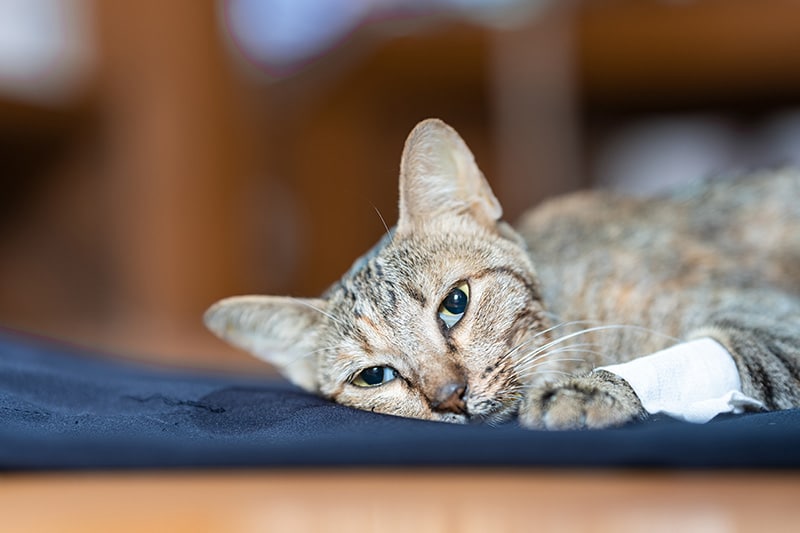
6. Routine & Environmental Changes
While simply moving a couch to the other side of the room or rearranging your cat’s bed or litter box may seem like small things to you, to your cat, it can be very anxiety-inducing. Other changes that may occur include moving house or welcoming a new pet or baby.
Cats love routine because it helps them to feel safe and secure, so when that routine is suddenly changed, it’s normal for a cat to feel stressed out. Not every cat will get majorly upset over routine and environment adjustments, some cats react more strongly to change than others.
7. Sudden Noises
Whether it be a loud clang from something falling over or a sound that’s quiet to you but that your cat can hear well, a wide variety of noises can startle a cat. Common sounds cats fear include the sound of a vacuum, electronic devices, coffee machines, balloons popping, objects falling, fireworks, thunderstorms, and anything that makes a hissing sound.
If we also factor in that a cat can hear about three times better than we humans can, it’s understandable that they can be startled by many sounds, including those we don’t even pick up on.
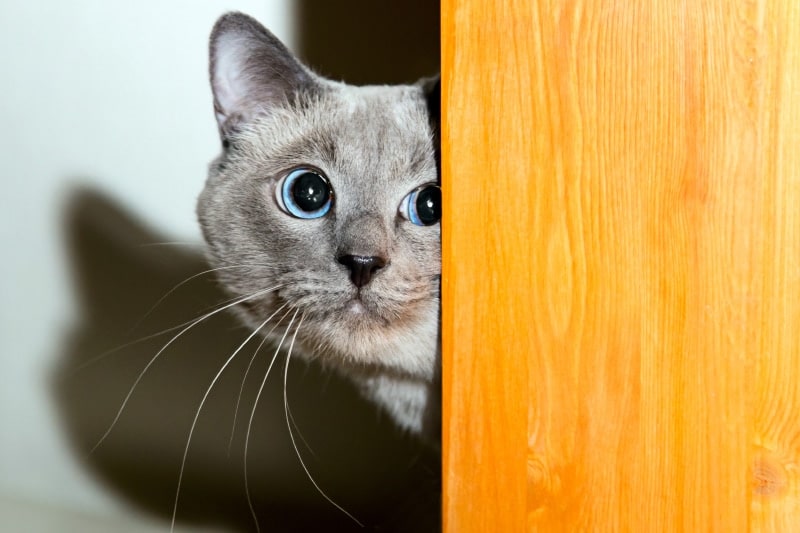
8. Sudden Movements
Let’s say your cat is hanging out on the window ledge, surveying the garden for birds, mice, and squirrels. This is like watching TV for your cat, and they sometimes get so excited that they chirp and chatter at the animals they spot.
However, if something from outside suddenly comes into your cat’s field of vision, like a bird flying close to the window or someone passing by your house, this could surprise them and send them running for cover. For some cats, even a sudden movement as minor as you crossing your legs or getting up from a chair can be startling.
9. Separation Anxiety
Does your usually happy cat get suddenly unsettled when you’re putting your coat on and grabbing your keys to go out for a while? Or perhaps they get extra clingy all of a sudden or start to meow excessively as you head for the door? If so, your kitty may be experiencing separation anxiety.
Though cats have a reputation for being aloof, they can actually form very close bonds with their human guardians, and some get anxious when their human isn’t around. In addition to those mentioned above, signs of separation anxiety include urinating or defecating outside the litter box, scratching at the door, destructive behavior, and being overly excited when you get back.
Those caring for anxious cats understand the struggles and discomfort that their companions feel on a daily basis. The innovative bowl shape of the Hepper Nest Bed provides nervous pets with support and its high sides offer a sense of security, diminishing stress and worry. To learn about how to the Hepper Nest can provide solace to your cat, click here.
At Catster, we’ve admired Hepper for many years and decided to take a controlling ownership interest so that we could benefit from the outstanding designs of this cool cat company!
10. Cognitive Decline
When cats get to their senior years, unfortunately, some suffer from a decline in their cognitive faculties. Signs of cognitive dysfunction include being more anxious, agitated, and restless than usual. Some cats withdraw from family life and no longer want to interact or be petted, but some become more clingy than usual.
Afflicted cats also often experience sleep changes, confusion, spatial disorientation, and lack of recognition of people and pets in the household. Reduced appetite, staring blankly at walls, and excessive vocalization are other signs. These signs tend to become noticeable over a period of time rather than appearing suddenly out of the blue.
What if My Cat Has Separation Anxiety?
- Leaving for short periods at first if possible, to help them build up to you being away for longer.
- Being slow with departure cues (e.g. putting your coat on a while before you leave instead of just before you head out) to gradually desensitize your cat to them.
- Providing distraction in the form of mentally stimulating toys that take time for your cat to complete, like a treat-dispensing toy or puzzle.
- Making sure your cat has access to a window ledge or cat tree so they can see outside for entertainment.
- Leaving the radio or TV on—especially a channel you often watch or listen to, as this gives a sense of familiarity.
- Making sure your cat has access to their favorite safe spots, like their bed or cat condo.
- Using pheromone diffusers.
Those caring for anxious cats understand the struggles and discomfort that their companions feel on a daily basis. The innovative bowl shape of the Hepper Nest Bed provides nervous pets with support and its high sides offer a sense of security, diminishing stress and worry. To learn about how to the Hepper Nest can provide solace to your cat, click here.
At Catster, we’ve admired Hepper for many years and decided to take a controlling ownership interest so that we could benefit from the outstanding designs of this cool cat company!
If nothing seems to work, you’ll want to contact a vet to rule out underlying health issues and decide on a course of action. Vets sometimes prescribe medication for separation anxiety. You might also want to consider consulting with a professional behaviorist.

If you need to speak with a vet but can’t get to one, head over to PangoVet. It’s an online service where you can talk to a vet online and get the personalized advice you need for your pet — all at an affordable price!
Conclusion
Cats can be suddenly frightened by minor things like a falling object, but sometimes, it runs a bit deeper. Issues like past trauma, separation anxiety, and health conditions may also make a cat stressed out and fearful, so if you suspect something isn’t quite right, please consult with your veterinarian to get to the bottom of things.
Related Reads:
- Why Is My Cat Afraid of the Ceiling Fan?
- What to Do When You’re Scared of Your Own Cat: Effective Tips & Tricks
- Why Is My Cat Staring at the Ceiling? 7 Common Reasons
Featured Image Credit: Zossia, Shutterstock

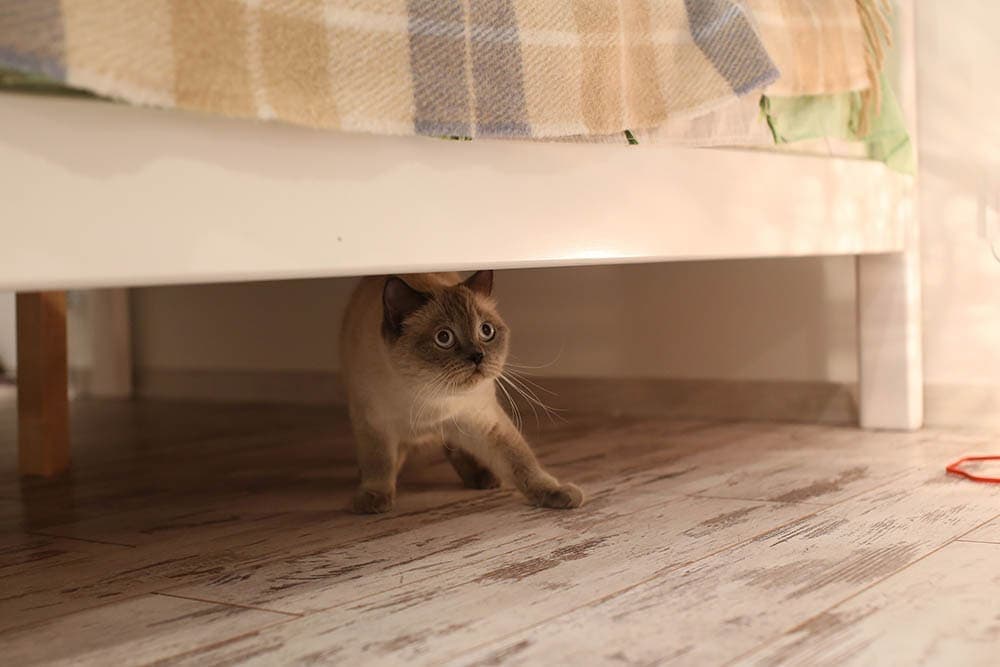






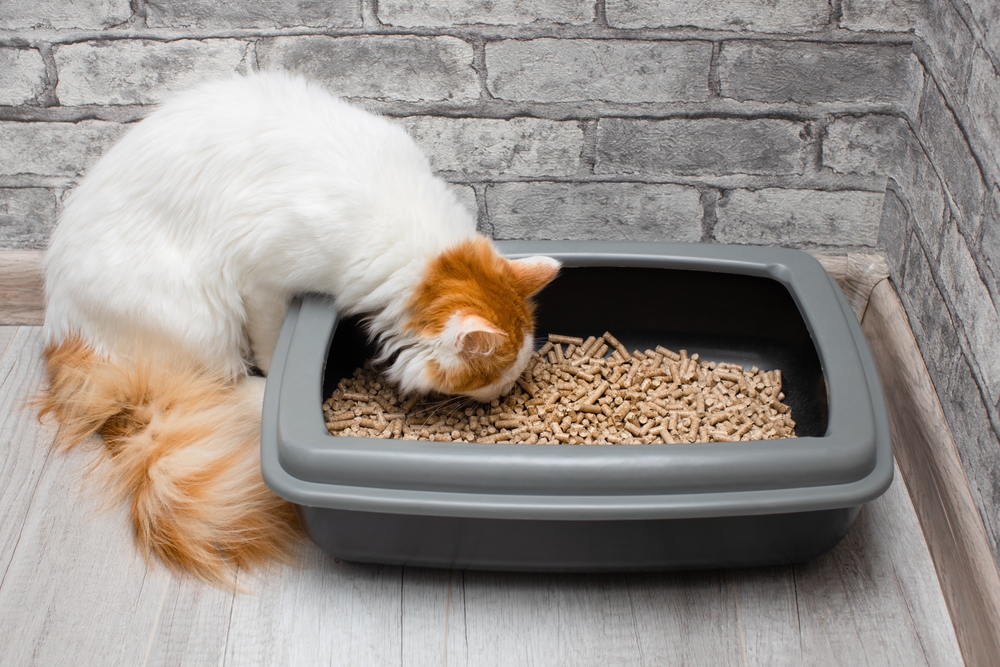
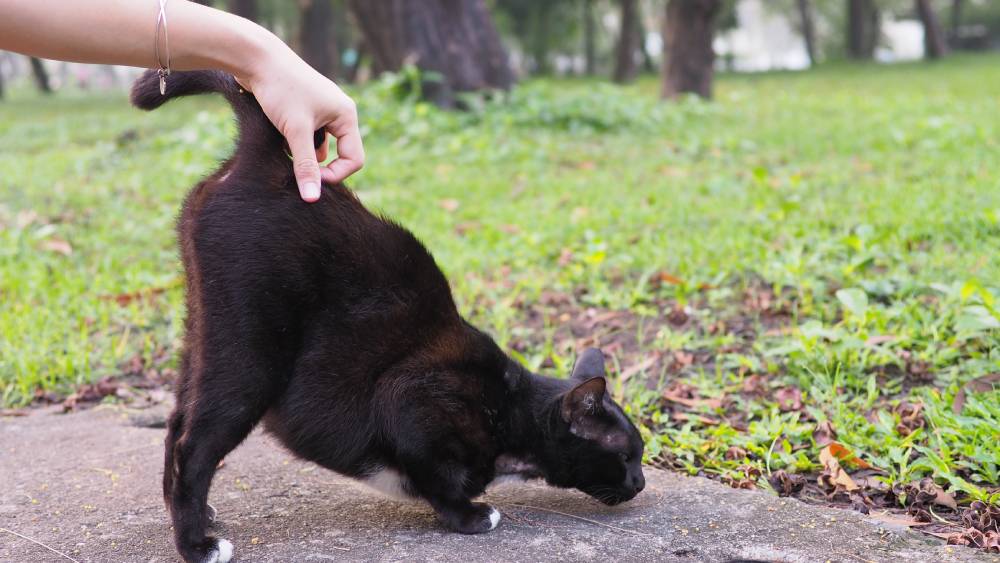






my cat refuses to come into the house from the garden. she only comes into eat. The vet has seen her and nothing wrong with health etc. Been in touch with Cat helper at local cattery nothing they said helps. she is outside in all weathers. At the moment I have locked her cat flap so she cant get out. she is hiding somewhere in the house
Hi Sandra,
Thank you for reaching out and sharing your concern. It can be distressing when our furry friends suddenly change their behavior. Cats can sometimes develop fears or anxieties due to various reasons, such as changes in their environment, new scents, or even noises that might be imperceptible to us.
Since you mentioned that she seems particularly uneasy indoors, there might be something specific that’s making her feel uncomfortable. You’re already doing a great job by using a Feliway diffuser to create a calming environment. However, it could be helpful to observe if there have been any recent changes at home or outside that could be affecting her.
Additionally, it should be noted that health problems of different kinds can also trigger behavioral changes in cats. If you're still worried about your cat’s behavior or if she continues to show signs of stress, it might be beneficial to get personalized advice from a veterinarian. At Pangovet.com, we offer online consultations with our team of vets who can provide guidance and help you understand what might be happening and the best steps to take.
We’re here to support you and your cat. Please don’t hesitate to reach out if you have any more questions or need further assistance.
Warm regards
My cat was scared (by a person in my apt) while using her litter box and has not used it since. My question is, will she use it again if I clean out again and place it in the bedroom? This happen Sunday the 11th. She has pooped on the floor and peeed on my bed. She was sacred on purpose.
Hi Lynda,
I'm so sorry to hear about your cat, that's not nice at all that she was scared on purpose. But, the good news is, she will very likely use it again with a little extra support from you. We have this article here that can hopefully help. https://www.catster.com/cat-health-care/how-to-retrain-a-cat-to-use-a-litter-box/
Alternatively, we do have an online veterinary service called PangoVet (https://pangovet.com/) where you could book a vet consult with one of our experienced veterinarians. They can help answer your questions and come up with a plan to get your cat feeling normal again.